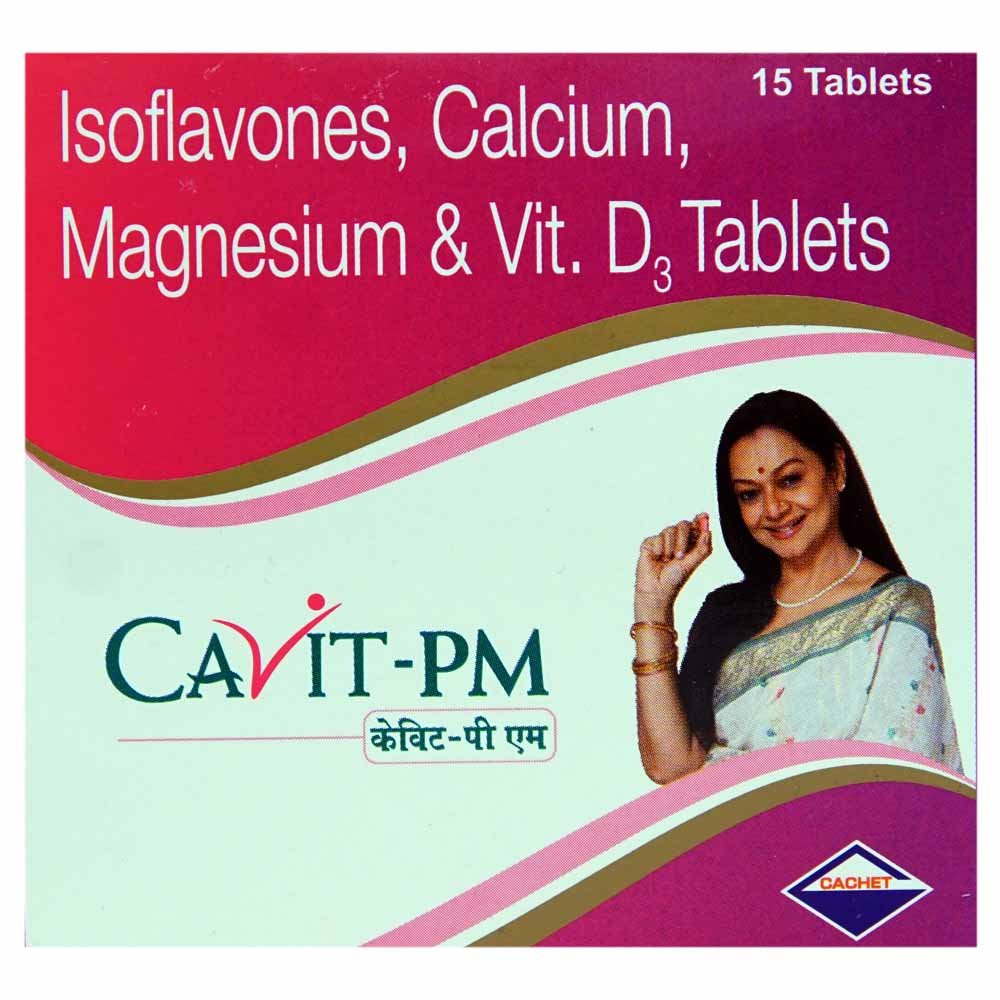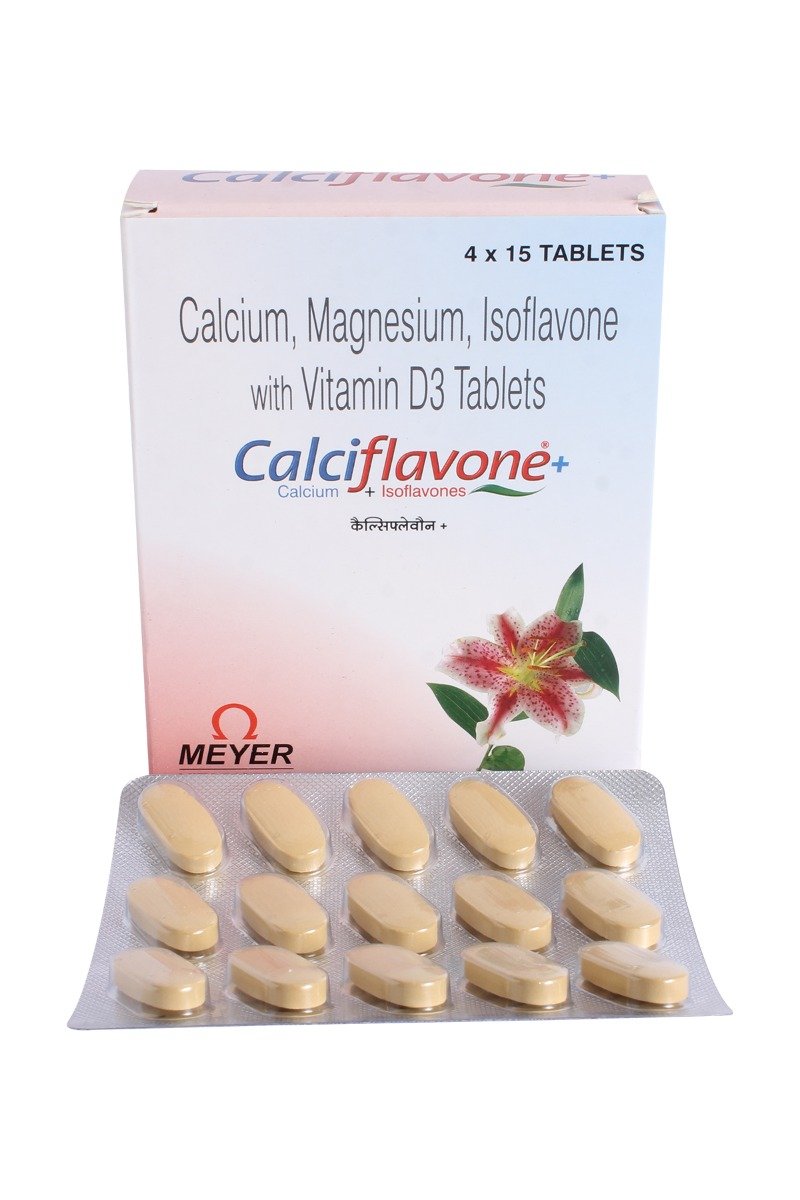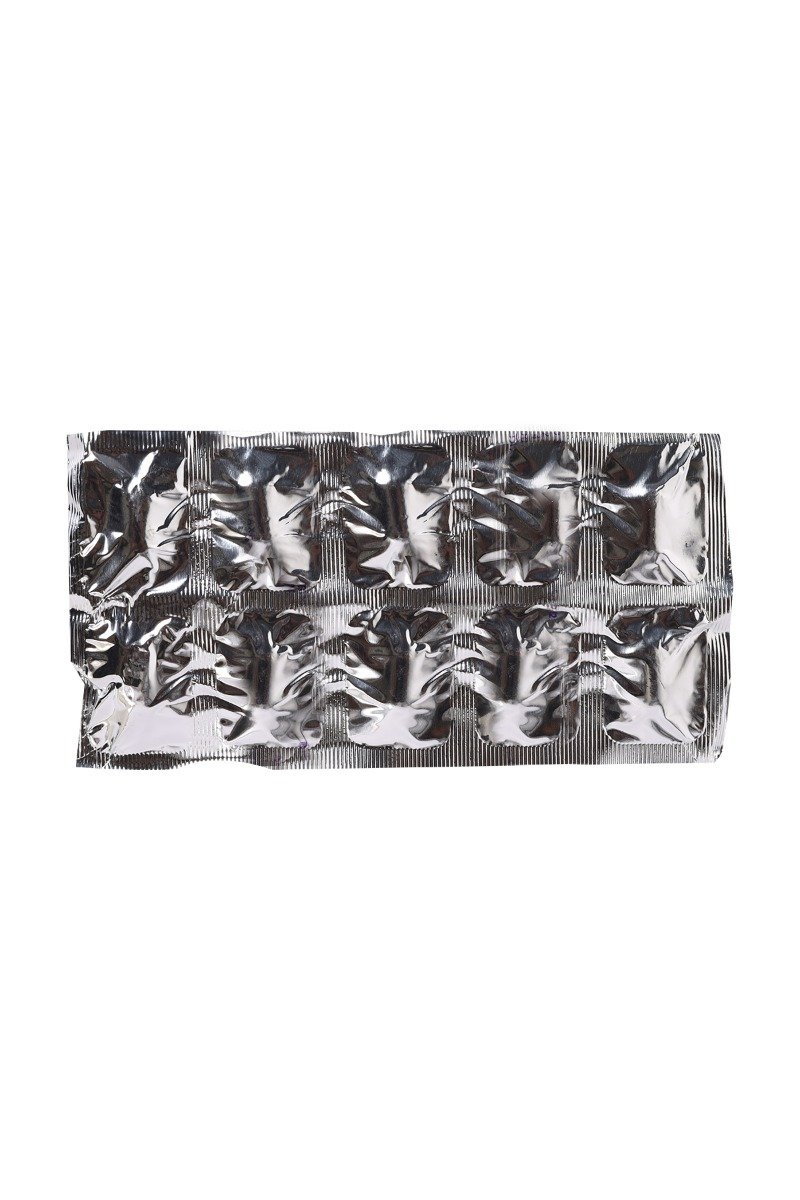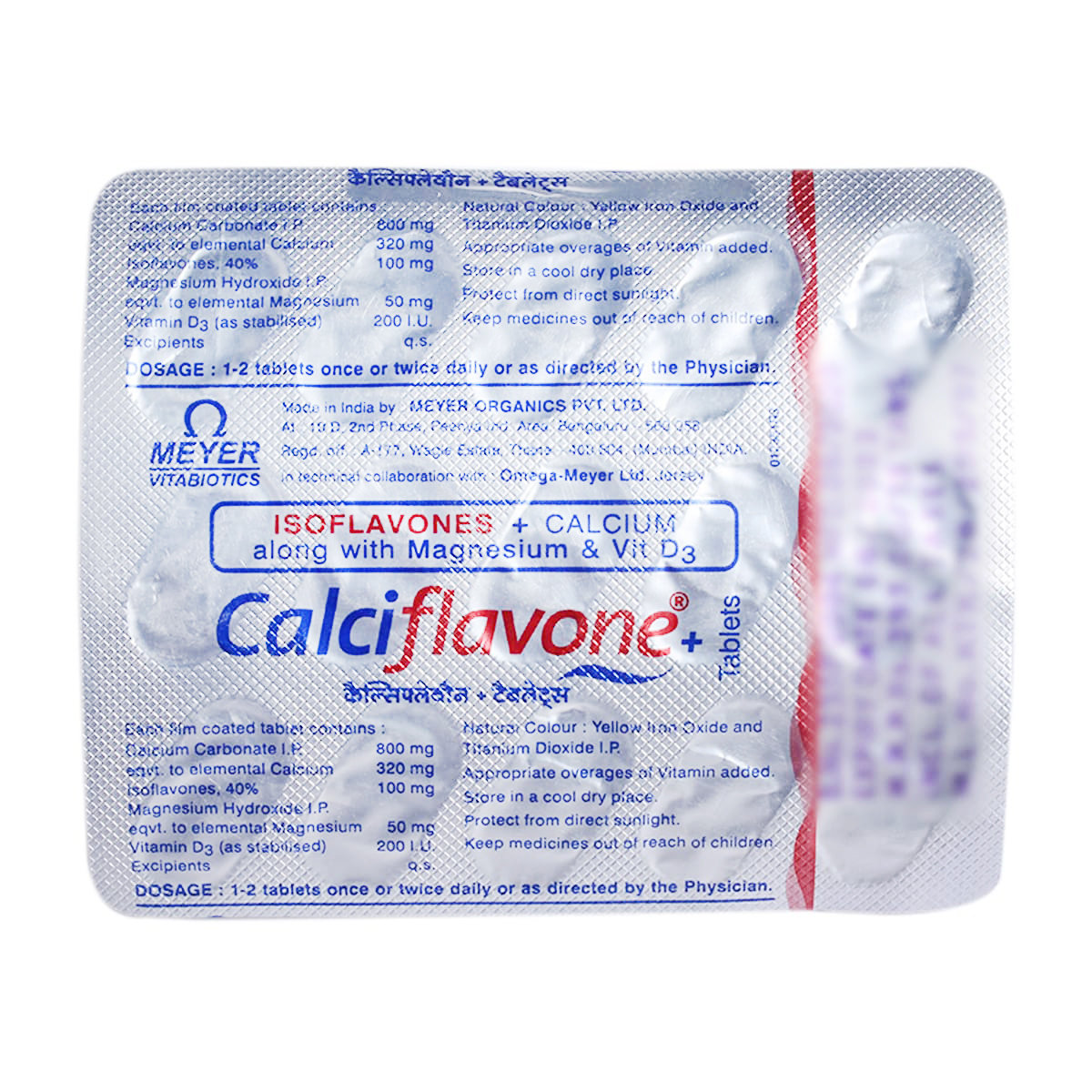Calcium+vitamin D3+magnesium Oxide+isoflavones
About Calcium+vitamin D3+magnesium Oxide+isoflavones
Calcium+vitamin D3+magnesium Oxide+isoflavones belongs to the class of medicines called dietary supplements used to treat post-menopausal osteoporosis (weak and brittle bones). Postmenopause is a condition in which women have not had a period for 12 months or longer. Osteoporosis is a bone disease that weakens and thins bones by decreasing bone density which is common in post-menopausal women. As the density of bones decreases, they weaken and are more likely to break.
Calcium+vitamin D3+magnesium Oxide+isoflavones contains Calcium (mineral), Vitamin D3, Magnesium oxide (mineral supplement) and isoflavones. Calcium is used to prevent or treat a calcium deficiency in people who do not get enough calcium from their diet. It provides essential nutrients to maintain bone formation. Vitamin D3 helps the body to absorb calcium and phosphorous. Thereby increases calcium levels in the blood and helps to build and maintain strong bones. Magnesium oxide is a mineral supplement essential for bone mineralisation and the formation of the bone matrix. Isoflavones work by preventing bone loss and strengthening bones.
Take Calcium+vitamin D3+magnesium Oxide+isoflavones as advised by your doctor. In some cases, you may experience stomach pain, nausea, loss of appetite, constipation or excessive thirst. Most of these side effects of Calcium+vitamin D3+magnesium Oxide+isoflavones do not require medical attention and gradually resolve over time. However, if the side effects persist or worsen, please consult your doctor.
If you are allergic to Calcium+vitamin D3+magnesium Oxide+isoflavones or any other medicines, please tell your doctor. If you are pregnant or breastfeeding, please consult a doctor before taking Calcium+vitamin D3+magnesium Oxide+isoflavones. Calcium+vitamin D3+magnesium Oxide+isoflavones is not recommended for children unless recommended by a doctor. You are advised to avoid using other vitamin D preparations with Calcium+vitamin D3+magnesium Oxide+isoflavones. Drive only if you are alert after taking Calcium+vitamin D3+magnesium Oxide+isoflavones.
Uses of Calcium+vitamin D3+magnesium Oxide+isoflavones
Medicinal Benefits
Calcium+vitamin D3+magnesium Oxide+isoflavones contains Calcium (mineral), Vitamin D3, Magnesium oxide (mineral supplement) and isoflavones. Calcium is used to prevent or treat a calcium deficiency in people who do not get enough calcium from their diet. It provides essential nutrients to maintain bone formation. Vitamin D3 helps the body to absorb calcium and phosphorous. Thereby increases calcium levels in the blood and helps to build and maintain strong bones. Magnesium oxide is a mineral supplement essential for bone mineralisation and the formation of the bone matrix. Isoflavones work by preventing bone loss and strengthening bones.
Directions for Use
Storage
Side Effects of Calcium+vitamin D3+magnesium Oxide+isoflavones
- Stomach pain
- Nausea
- Loss of appetite
- Constipation
- Excessive thirst
Drug Warnings
If you are allergic to Calcium+vitamin D3+magnesium Oxide+isoflavones or any other medicines, please tell your doctor. If you are pregnant or breastfeeding, please consult a doctor before taking Calcium+vitamin D3+magnesium Oxide+isoflavones. Calcium+vitamin D3+magnesium Oxide+isoflavones is not recommended for children unless advised by a doctor. Regular blood tests are recommended while taking Calcium+vitamin D3+magnesium Oxide+isoflavones to monitor calcium levels in the blood. Do not take Calcium+vitamin D3+magnesium Oxide+isoflavones if you have hypercalcaemia (high calcium levels in the blood) or hypervitaminosis D (high levels of vitamin D in the blood). You are recommended to avoid using other vitamin D preparations with Calcium+vitamin D3+magnesium Oxide+isoflavones.
Drug Interactions
Drug-Drug Interaction: Calcium+vitamin D3+magnesium Oxide+isoflavones may interact with benzodiazepine (alprazolam), high blood pressure-lowering medicine (metoprolol), painkiller (aspirin), antidepressant (duloxetine), iron supplement (ferrous sulphate) and thyroid drugs (levothyroxine).
Drug-Food Interaction: Avoid spinach, rhubarb, bran and whole grains with Calcium+vitamin D3+magnesium Oxide+isoflavones as they may reduce the absorption of calcium.
Drug-Disease Interaction: If you have vomiting, nausea, hypercalcaemia (high calcium levels in the blood), hypervitaminosis D (high levels of vitamin D in the blood), malabsorption, electrolyte imbalance, kidney or heart disease, inform your doctor before taking Calcium+vitamin D3+magnesium Oxide+isoflavones.
Drug-Drug Interactions Checker List:
Safety Advice

Alcohol
cautionInteraction of alcohol with Calcium+vitamin D3+magnesium Oxide+isoflavones is unknown. Please consult a doctor before consuming alcohol with Calcium+vitamin D3+magnesium Oxide+isoflavones.

Pregnancy
cautionCalcium+vitamin D3+magnesium Oxide+isoflavones is advised for pregnant women only if your doctor thinks the benefits outweigh the risks. Please consult a doctor if you are pregnant.

Breast Feeding
cautionPlease consult a doctor if you are breastfeeding. However, if you are taking Calcium+vitamin D3+magnesium Oxide+isoflavones while breastfeeding, the serum calcium levels of mother and infant should be monitored.

Driving
cautionDrive only if you are alert after taking Calcium+vitamin D3+magnesium Oxide+isoflavones.

Liver
cautionTake Calcium+vitamin D3+magnesium Oxide+isoflavones with caution, especially if you have a history of Liver diseases/conditions. The dose may be adjusted by your doctor as required.

Kidney
cautionTake Calcium+vitamin D3+magnesium Oxide+isoflavones with caution, especially if you have a history of Kidney diseases/conditions. The dose may be adjusted by your doctor as required.

Children
cautionCalcium+vitamin D3+magnesium Oxide+isoflavones is not recommended for children unless advised by a doctor.
Habit Forming
Diet & Lifestyle Advise
- Include dairy products like milk, yoghurt, cheese, or milk-based custard in your diet.
- Eat daily a serving of broccoli, cabbage, bok choy (Chinese white cabbage), spinach, and other green leafy vegetables.
- Snack on calcium-rich nuts like Brazil nuts or almonds.
- Sprinkle sesame seeds over your food, vegetables, and salads. Sesame seeds are high in calcium.
- Avoid or reduce the intake of caffeine, soft drinks, and alcohol as they might inhibit calcium absorption.
- Replace the meat with tofu or tempeh for extra calcium in your food.
- Drink plenty of water to avoid dehydration.
Patients Concern
Disease/Condition Glossary
Osteoporosis: It is a bone disease that weakens and thins bones by decreasing bone density. As the density of bones decreases, they weaken and are more likely to break. Post-menopausal women are more likely to develop osteoporosis than men because, at menopause, a woman’s ovaries stop production of oestrogen (a female hormone) that is essential to keep bones healthy. Following menopause, bone loss occurs, making bones weak and more likely to break. Also, long term use of steroids may affect bone strength and cause osteoporosis in both men and women. Signs and symptoms include back pain caused by a fractured or collapsed vertebra, loss of height over time, a stooped posture, a bone that breaks much more easily than expected.
FAQs
Calcium+vitamin D3+magnesium Oxide+isoflavones contains Calcium, Vitamin D3, Magnesium oxide and isoflavones. Calcium is used to prevent or treat a calcium deficiency in people who do not get enough calcium from their diet. Vitamin D3 helps the body to absorb calcium and phosphorous. Thereby increasing calcium levels in the blood and helping to build and maintain strong bones. Magnesium oxide is a mineral supplement essential for bone mineralisation and the formation of the bone matrix. Isoflavones work by preventing bone loss and strengthening bones.
You are not recommended to take Calcium+vitamin D3+magnesium Oxide+isoflavones if you have hypercalcemia (high levels of calcium in the blood) as it may worsen the condition. However, the levels of calcium and vitamin D may be checked before starting treatment with Calcium+vitamin D3+magnesium Oxide+isoflavones.
Calcium+vitamin D3+magnesium Oxide+isoflavones may cause constipation as a temporary side effect. However, if the condition persists or worsens, please consult a doctor.
You are not recommended to take Calcium+vitamin D3+magnesium Oxide+isoflavones with levothyroxine as co-administration of these two medicines at the same time may reduce the effectiveness of levothyroxine. However, if you are supposed to take both medicines, you are advised to maintain a time gap of a minimum of 4 hours between taking Calcium+vitamin D3+magnesium Oxide+isoflavones and levothyroxine.
Calcium+vitamin D3+magnesium Oxide+isoflavones should be used with caution in patients with kidney disease as it may worsen the condition. Therefore, inform your doctor if you have any kidney problems before taking Calcium+vitamin D3+magnesium Oxide+isoflavones.








